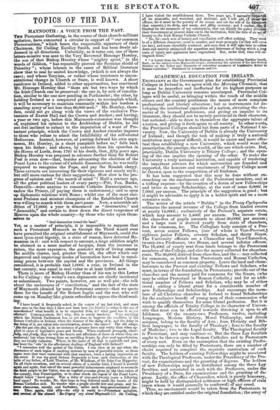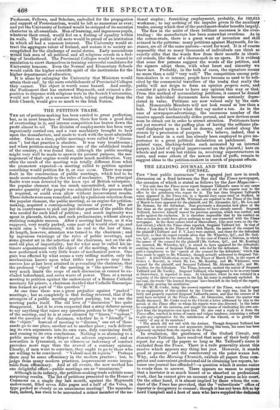ACADEMICAL EDUCATION FOR IRELAND.
EXCELLENT as the Government plan for establishing Provincial Colleges in Ireland is, we agree with the Morning Chronicle, that it must be imperfect and ineffectual for its highest purposes so long as Dublin University remains unenlarged. Provincial Col- leges will be useful, as bringing within the reach of the middle classes and the country gentlemen the means of more complete professional and literary education ; but as instruments for de- veloping the intellectual capacities of a nation, elevating the cha- racter of its learned professions, and giving an impulse to its literature, they should not be merely provincial in their character, but national—able to draw to themselves the aggregate talent of a nation, and giving it forth again to all society. In other words, the Provincial Colleges should but form is of a National Uni- versity. Now, the University of Dublin s already the University of Ireland ; and though the task of making it truly a national institution may appear difficult, it would be easier and more effec- tual than establishing a new University, which would want the prescription, the prestige, the wealth, of the one which exists. But, practically, Dublin University is Trinity College ; and the open- ing of the one implies the opening of the other. To make the University a truly national institution, and capable of rendering the important services for which universities are founded and supported, the honours and emoluments of Trinity College must be thrown open to the competition of all Irishmen. It has been suggested that this may be done without en- croaching on the emoluments of the Protestant members, and at a trifling expense—by the creation of a dozen of new Fellowships and twice as many Scholarships, at the cost of some 6,0001. or 7,0001. per annum. The principle of the suggestion is good ; but it might be advisable to apply it in a bolder spirit and on a more extensive scale.
The writer of the article "Dublin" in the Penny Cyclopedia estimates the annual revenue of the College from landed estates at nearly 14,000/. ; exclusively of the Provost's separate estate, which may amount to 2,400/. per annum. The income from the class-fees of pupils amounts to about 30,0001. per annum; and a large sum is derived yearly from rents of chambers, fees for commons, &c. The Collegiate body consists of a Pro- vost, seven senior Fellows, (one of whom is Vice-Provost,) eighteen junior Fellows, seventy Scholars, and thirty Sizars. The University officials are a Chancellor and Vice-Chancellor, twenty-two Professors, two Deans, and several inferior officers.' The 16,400/. of yearly rent from lands belongs to the Protestant members of the College, and also the money collected for chamber- rents. The 30,0001. derived from class-fees, and the money collected for commons, as levied from Protestants and Roman Catholics, may be considered as common property. Leave the land and cham- ber-rents to the Provost and existing Fellows and Scholars, who must, in terms of the foundation, be Protestants; provide out of the class-fees and the money paid for commons for the Sizars, (who may be either Protestant or Roman Catholic,) and for an addi- tional number of Fellows and Scholars, who may be of either creed ; adding a liberal grant for a considerable number of new Fellowships and Scholarships. And encourage the mem- bers of all Christian churches in Ireland to found Scholarships for the exclusive benefit of young men of their communion who wish to qualify themselves for some liberal profession. But it is among the officials of Trinity College in its character of Univer- sity that most can be effected towards throwing it open to all Irishmen. Of the twenty-two Professors, twelve, including Languages, Modern History, Moral Philosophy, and divers sciences, belong to the faculty of Arts ; four, Divinity and Bib- lical languages, to the faculty of Theology; four to the faculty of Medicine ; two to the Legal faculty. The Theological faculty is Protestant, and may continue so. But the three Lay faculties ought to be thrown open to Roman Catholics and to Protestants of every sect. Even on the assumption that the existing Profes- sorships can only be filled by Protestants, there are a number of
chairs required to complete the requisite curriculum of each faculty. The holders of existing Fellowships might be associate(' with the Theological Professors, under the Presidency of the Pro-
vost, for examinations and the granting of degrees. The holders of new Fellowships might be distributed among the three Lay- faculties, and associated in each with the Professors, under the Presidency of a Dean, for examinations and the granting of de= grees. Lastly, the office of Chancellor, which is purely honorary, might be held by distinguished noblemen or high Officers of state (upon whom it would generally be conferred) of any creed. Thus, no emoluments would be taken from the Protestants to which they are entitled under the original foundation ; the array of
Professors, Fellows, and Scholars, embodied for the propagation and support of Protestantism, would be left as numerous as ever; and yet the University of Ireland would be stripped of its sectarian character in, all essentials. Men of learning, and ingenuous pupils, whatever their creed, would feel on a footing of equality within its malls. The public of all sects would be proud of an institution in which all had a common interest. The University would at- tract the aggregate talent of Ireland, and restore it to society ac- co lisp for the discharge of social duties. Early associations 'pi2znald link men of all political and all religious creeds in a feel-
mg of brotherhood. The Provincial Colleges would be roused to emulation to exert themselves in training successful candidates for University honours. Even the Normal and Elementary Schools would catch the higher scientific spirit of the institutions for the higher departments of education. It is alone by enlarging the University that Ministers would attain their end ; by the mere establishment of Provincial Colleges they cannot. The object is worth some hazard. And surely, the Parliament that has endowed Maynooth, and evinced a dis- position to dispense with religious tests in the Scotch Universities, would not boggle at a measure which, taking nothing from the Irish Church, would give so much to the Irish Nation.



























 Previous page
Previous page